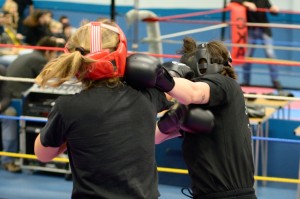A couple of weeks ago I was having a chat with a friend who started white collar boxing in a local Cambridge club late last year. He described his first day in that club in a way that many would depict as a horrifying experience. He was asked to enter the ring to spar with 5 established, fit and trained athletes from that gym, just to see “what he’s got”. Result was, unsurprisingly, that he had a black eye and bruised nose. In my opinion the above described event could indeed be a good approach to check who really has the guts to step into a ring without necessarily being prepared for that kind of confrontation; it’s also a great way of losing, by the dozens, potentially good students and future promising fighters, by discouraging them to continue training.
As a martial artist and a coach I find this kind of attitude very much old school and outdated; I like to teach, instil and apply what we could define as a dignified approach to sparring beginners, a methodology that encourages a novice student to starts her first steps into sparring without unnecessary risks of getting hurt.
Sparring is about putting in practice what technical lessons are teaching: techniques, combinations, foot work, attacking, defending and blocking; it all gets mixed together at fast pace and without precise order. At first this is all very confusing and often overwhelming; for some people sparring triggers nearly irrational violent instincts while others simply freeze and get frustrated, feeling incapable of delivering decent performance.
We must assume that any decent martial arts club will have a bunch of senior students and members who are skilled in sparring and fit for fighting. Some of them are perhaps competing at local, regional or national level. These people have both the skill and the fitness to potentially hurt, seriously hurt, a beginner if just they wanted to. However it makes very little sense to do that; I educate all of my students to avoid exploiting the advantage they have on beginners.
A dignified approach to sparring beginners is simply about setting your skills at a level that is slightly better than the beginner you are training with and showing her how you can score on them starting from a fairly soft level of contact. Pressure of contact can and should be increased as and when applicable. This methodology ensures that the advanced student is winning the round and maintains its technical superiority while it offers a list of advantages to both people sparring:
- Better control of the fight
- Reduced risk of injuries from both sides
- Fostering an increasing self confidence for the beginners that ultimately helps to improve her technique and sparring skills
In some cases the dignified approach to sparring beginners becomes difficult to maintain because:
- The beginner is learning and progressing a lot faster than expected and her techniques from one session to the other improves to a much better point
- The beginner builds up a false illusion that her sparring skills are now sufficient to put in difficulty the advance student
- The beginner gets enraged and starts hitting without any control
In the above cases we usually approach the problem with a few words of advice; if the beginners still misbehaves out of logical control we suggest increasing the pressure until it is enough to win the round and educate her.
So if you are a beginner you can be assured that your first sparring sessions will not be traumatic and testing what “you have got” but be aware that there are usually many people in the club that can potentially harm you so respect for your opponent is always a must.


